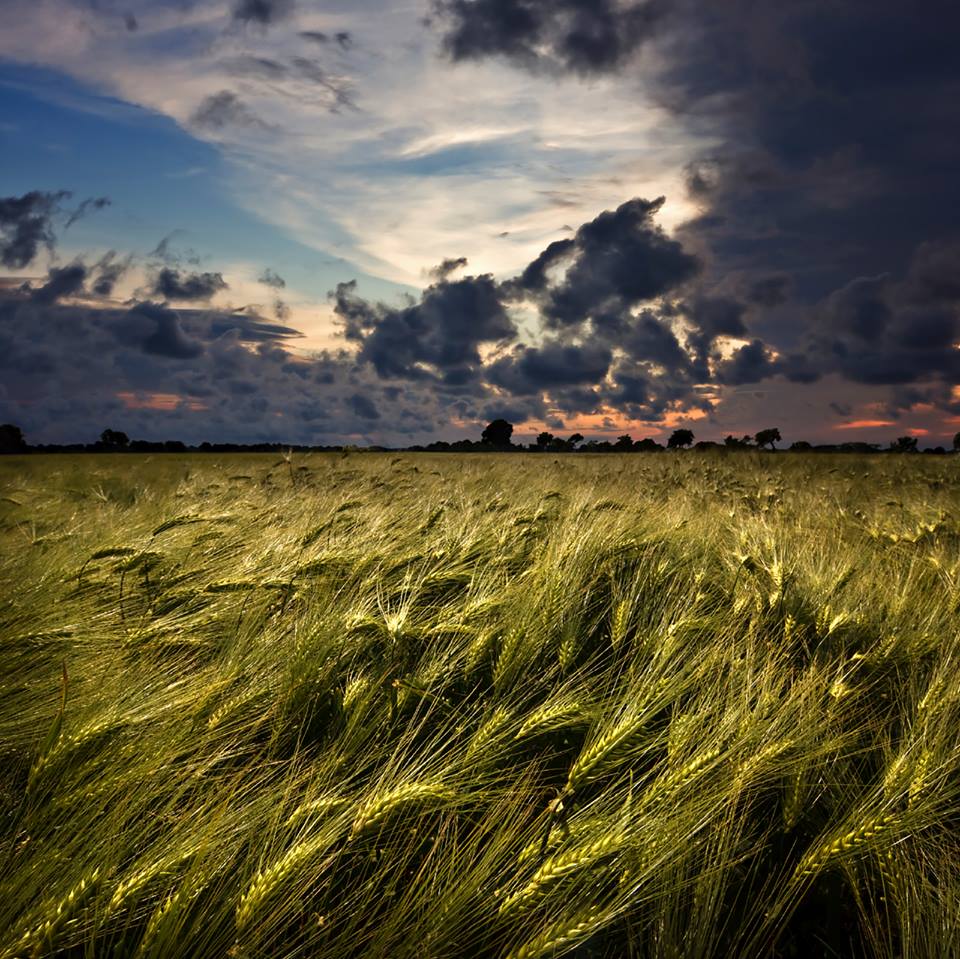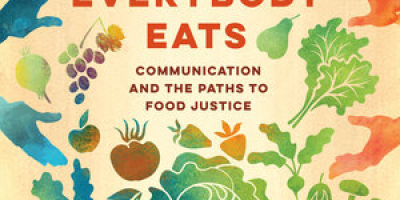This is a reposting of a blog-post by FCRN’s Tara Garnett for the Women’s Environmental Network, 1st August 2017. We are reposting it with permission and the original post can be found here.
Dr Tara Garnett initiated and runs the Food Climate Research Network at the University of Oxford. Her work focuses on the contribution that the food system makes to greenhouse gas emissions and what could be achieved by changes in behaviour.

Plating up solutions: Knowledge for better food systems
Our need to eat every day until we die, has quite literally transformed the face of this earth. To grow our crops and rear our animals, we have cleared about 40% of the earth’s surface, felled trees, and driven species to extinction. We have emptied lakes, aquifers and rivers - 70% of the irrigation water we use worldwide is to grow food – and in return we have polluted those same water sources with nitrates, phosphates and pesticides. We are hoovering up the oceans too to the point that 90% of fish stocks today are either fully fished or overfished. And then there is the little matter of climate change. The production, distribution, processing and consumption of food generate some 25-30% of global climate changing greenhouse gas emissions: largely because of livestock production and from agriculturally-induced land use change. Producing the food we need to survive, is in short, endangering our survival prospects.
We do all these damaging things in order to feed ourselves, and in many ways we have done so extremely successfully. The number of people today who don’t get enough to eat, both in absolute terms and as a proportion of the global population has fallen substantially to less than 800 million, out of a total global population of 7 billion. This is an enormous achievement. The diversity of our food has increased too – in the affluent west and in many emerging economies too, we have more choice than there are ‘eating occasions’- as food industry jargon puts it. But underlying this cheery representation are some more disturbing realities.
The truth is that in a world awash with food, relatively few of us get sufficient quantities of the right kinds, foods that nourish us. About 2 billion of us are overweight or obese and are at risk from diet related diseases such as diabetes, heart disease, strokes and some cancers. This is not just a rich-people-rich-world phenomenon: most of the overweight and obese today are citizens of middle and increasingly low income countries; with the poor more likely to be fat than the rich. Bad diets - those rich in processed foods, salt, sugar and animal fats - now kill more people, according to the World Health Organisation, than unsafe sex, drugs, alcohol and tobacco combined. Then there is hidden hunger - about 2 billion of us may or may not have normal BMI, but nevertheless suffer from nutrient deficiencies, particularly iron, vitamin A and iodine. These are a major cause of physical and cognitive impairments that particularly affect developing countries, and which hit women and young children hardest. And of course, there are still the 800 million people worldwide who do not get enough to eat, of whom 200 million are children, whose life prospects will be impeded by both physical ill health and developmental delays.
Unsurprisingly, inequality lies at the heart of many of these problems. About 1.3 billion people worldwide rely one way or another on food production and many of them subsist below the poverty threshold of $1.25 a day. People who produce food are also dependent on markets to buy food – they are not self-sufficient. And while in an affluent country such as the UK, we spend only about 10% of our household incomes on food, in a country such as Cameroon, the figure approaches 50%. If most of your budget goes on food, you have less money available for spending on health care, on education, and the inevitable contingencies that strike, which locks people into a cycle of poverty. On the other hand, just four companies account for a third of food sales worldwide, generating enormous profits that they invest into expanding further into new markets, wooing new customers and increasingly dictating to us what we eat, when and how. Gender is a constant thread that runs through this narrative of unequal power structures. Women are less likely to own land, or to control assets or finances. They are more likely to do the backbreaking agricultural ‘dirty work’ or to be insecurely employed in low skilled, low paid food manufacturing jobs. When food is short, women are less likely to eat.
Lots of us are in the UK are starting to become aware of these problems. More and more of us feel a sense of dis-ease when new, unneeded products tempt us; when we hear how many people in our wealthy country rely on food banks; when we browse the coffee, tea, or chocolate aisles and ask ourselves: ‘who suffered for my caffeine fix?’; or when we hear about rainforests burning so that we can have palm oil, or meat.
Some people – not quite as many – but still an impressive number, are responding in more active and imaginative ways: by setting up cookery clubs, box schemes, gardening projects, school education programmes, new food swapping apps, boycotts…. the list is seemingly endless.
But for positive change to happen it needs to actually deliver positive change. Underlying this somewhat circular statement is the point that we need to know what ‘good’ actually looks like – for people’s health, for our society, for the environment – and how we measure progress towards or away from it. Just because something feels right, doesn’t necessarily mean that it is. Common sense is, after all, the sense that tells us that the earth is flat. And then there is the question of one’s ideology and personal values: my vision of what good looks like might be different from yours. In which case, who is right – and who gets to decide?
This is where the academic community can help. Civil society is doing wonderful, creative and vigorous things, but it could be more effective still if informed by good evidence and by a critical self-appraisal of those ‘common sense’ assumptions that inform their activities, but that may not always really be true.
Is big bad and small always beautiful, and if so beautiful in what way and for whom? Are organic food systems really better than non-organic ones? Is the food industry always ‘the enemy’? Is home cooked food always healthier and more sustainable than shop-bought? Which bits of food traditions and culture do we value and which do we not, and who gets to choose? What happens when environmental, cultural and health goals conflict, as they sometimes do? In short, if something looks good, is it really better?
At the same time sitting back and saying “everything is so complex and subjective that we can’t possibly act” is not exactly helpful; worse, it can be seen as an excuse for inaction. Research questions and projects, should help civil society to address difficult food systems issues in a critical but practical way. Academics do sometimes need reminding of this fact…
Which is where the Food Climate Research Network comes in. Based at the University of Oxford, we work at the intersection of the academic, civil society and business communities. Our purpose is to provide accurate, impartial and accessible knowledge on food systems, drawing upon the latest research, showing the picture ‘in the round’ and highlighting the awkward tensions and conflicts that need considering. We act as a ‘critical friend’ to civil society: we are here to challenge assumptions while also helping to provide the knowledge civil society needs to advocate and act for constructive change. In return, civil society forces us to think about the ‘so what?’ factor: how does the new knowledge that the research community brings relate to the urgent priorities we face today? What more do we need to know in order to advance change?
How do we work? We engage in various ways – through giving talks, running events and other ‘physical’ means. But to reach a broader audience we have invested a huge amount of time and effort into our online resources and network, which we’d encourage you to use.
Our main website www.fcrn.org.uk houses our many publications on topics as diverse as ‘What is a sustainable healthy diet?’ through to explorations of China’s changing food system, or of possible futures animal production and consumption. We also house an online research library containing summaries of and links to some 3,500 publications, all fully searchable. And anyone can join our growing membership – in so doing you receive our weekly information-packed newsletter, Fodder, and connect to a membership of thousands of individuals across the world from multiple sectors, all concerned with developing and sharing knowledge on how to make food systems more sustainable. To support this, we also share – via our website and newsletter - the information members send us about events, jobs, opportunities, and new research.
Because there is such a rich but somewhat bewildering array of information on our main website and more generally online, we also felt there was a need for a simpler, more structured overview of the issues to help everyone build food systems literacy. This is why we created Foodsource. This free online learning resource provides a clear, advocacy free, and evidence-based ‘walk through’ of food system issues for students, civil society, and people working in the food industry, or just interested individuals. It covers concerns ranging from food production and its relationship with climate change and other environmental concerns through to diets, health and sustainable consumption.
The website is a working progress: we are actively working to further develop and improve it, in collaboration with people who use it. This means that we are really keen to hear feedback and to discuss new ideas and suggestions as to how we could make it more useful and relevant. So please take a look at it, tell us what you think, and let us know how you feel it could be improved. Either contact me, Tara Garnett taragarnett@fcrn.org.uk or the Foodsource manager, Sam Lee-Gammage samleegammage@fcrn.org.uk. We look forward to hearing from you.
















Post a new comment »